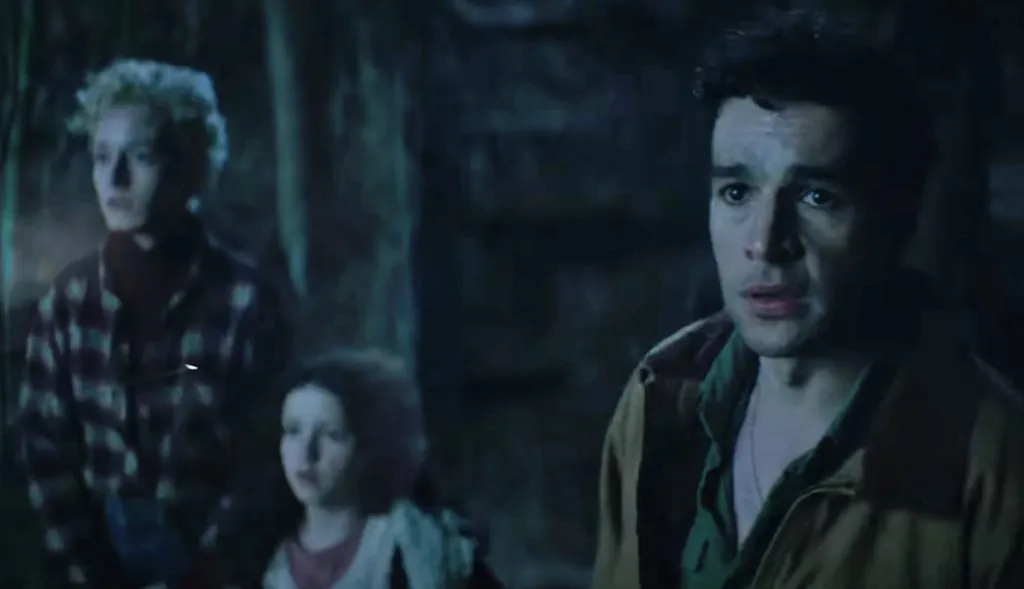
******************This review contains a major spoiler*********************
Following the unsuccessful attempt at launching a cinematic universe of its legendary monsters, Universal Pictures went back to the drawing board and outsourced the attempt at modernizing the iconic terrors to indie horror production company Blumhouse who built their reputation for quality and box office success on films like Paranormal Activity, The Purge, and Get Out. Their first entry was similarly successful in 2018’s The Invisible Man directed by Leigh Whannell. Now their and Whannell’s second attempt at the Universal Monsters hits theaters with Wolf Man.
The film stars Christopher Abbott as Blake Lovell, an unemployed writer living in New York City with his journalist wife Charlotte (Julia Garner) and their daughter Ginger (Matilda Firth) where they attempt to balance Charlotte’s burgeoning career and Blake’s current stint as a dad staying at home while searching for work. Blake soon receives word this his missing dad Grady (Sam Jaeger) has been legally declared dead. The family travels to Blake’s rural farm in Central Oregon to gather his father’s belongings and take some time to themselves. While there, the encounter a strange creature while driving to Blake’s childhood home and are attacked by it. While barricading themselves inside as the creature prowls outside, Blake begins to behave strangely, transforming into something unrecognizable that soon jeopardizes his wife and daughter.
From the onset of the film, the tension and horror anxiety are turned to 11 as we start with a 30-year flashback showing an encounter that young Blake has with the mythical beast in the forest alongside his father. The two encounter the creature before being cornered on a deer tower as the beast slowly climbs the structure, its cold breath visible just above the wall. It establishes both the mystery and creepiness of the beast perfectly right at the onset, as well as establishing backstory for its main character. Whannell plays around with perspective in an interesting way as well, switch from Blake’s point of view to Charlotte’s about halfway through the film following the beginning of Blake’s transformation with a creative fade-in scene transition that follows Blake’s hearing to Charlotte’s voice. The way the film changes Blake’s transforming consciousness alongside his changing physical characteristics is creatively done as well, showing the audience how both his hearing and sight change in addition to his appearance. Here, his perspective changes to a neon-tinged world with human eyes colored blue as he slowly becomes unable to understand speech. It’s a creative twist on displaying the classic Wolfman creature.
Aside from the film’s horror elements, Whannell and co-writer Corbett Tuck attempt to imbue the film with some depth in its theme surrounding the relationship between Blake and his father Grady. Grady’s insistence on passing down his survivalist training to young Blake came along with his son inheriting his bad habits of irritability and poor temperament. It’s a problem Blake is cognizant of and tries heartily not to pass onto his own family, especially Ginger, as the audience sees throughout. It’s an exploration of generational trauma that is largely shown through the metaphor of being infected with the Face of the Wolf and the resulting metamorphosis into the Wolf Man. Just as he inherited poor patriarchal behavior from his father, Blake had also been infected with this literal monster from his father who received it while hunting it down, and now fights internally against both all the same. It’s an interesting tact to modernize the concept of the classic modern, much as The Invisible Man before it, but Wolf Man lacks the in-depth analysis that its predecessor had, instead feeling half baked and not as thoroughly covered as it could’ve, and probably should’ve, been.
The juxtaposition to his father and internal conflict that Blake suffers from both barely get past the concept stage and are left up to the audience to extrapolate rather than time being spent showing the metaphor onscreen. Striking balance between straightforward horror thrills and thematic exploration can be delicate and Wolf Man comes across as a film that unsuccessfully tried to serve two masters in this regard. Abbott, Garner, and Firth display believable chemistry as a family, but their performances aren’t more than just pretty good, unusual and slightly disappointing for actors as talented as Abbott and Garner are specifically. This too is probably attributable to the undercooked script that hampers Wolf Man from reaching its full potential. That isn’t to say this is an issue that could be rectified with an extended runtime as the film meanders a bit in its second act and begins to feel long, despite the short hour and forty-three minute length, until the third act revvs up the action and scares again. This one feels more like a slight misstep than the next quality take on a classic character.
Image: Universal Pictures

